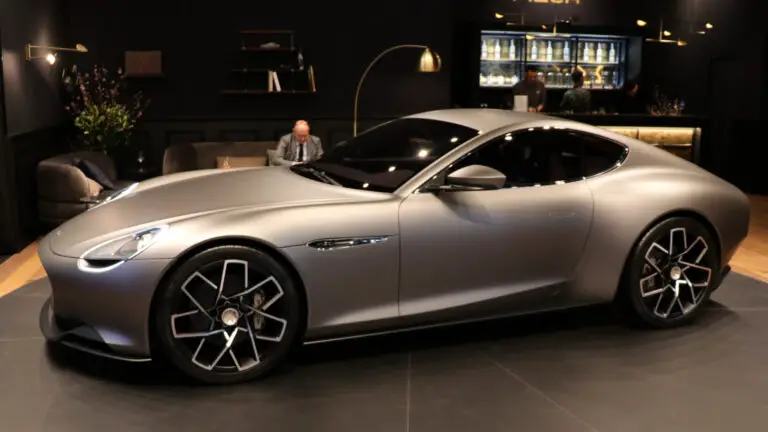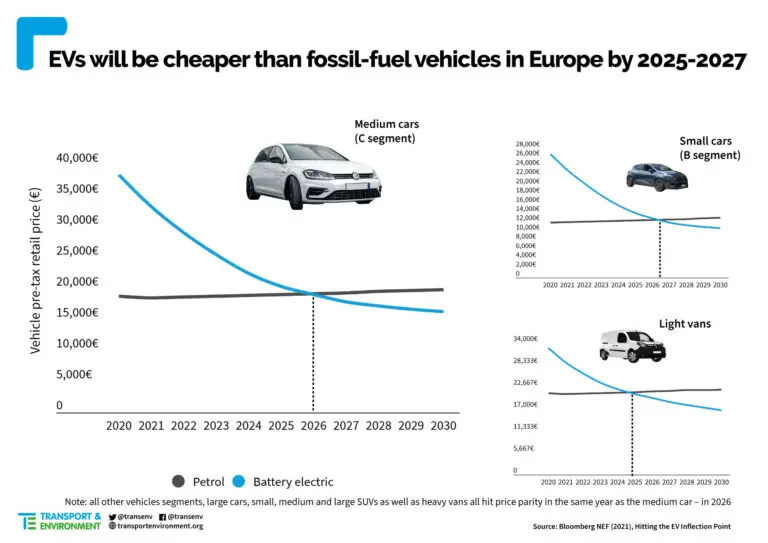A study predicts electric vehicles in Europe will be cheaper than fossil-fuel cars by 2025 to 2027 with BEV reaching 100% of sales by 2035.

A study by BloombergNEF for Transport & Environment concluded that many electric cars in Europe will be cheaper than petrol cars from 2026. Small electric light vans will already be cheaper than fossil fuel versions in 2025 with heavy vans making the cross-over only a year later. Tighter EU CO2 targets in the 2020s could see 100% of new car sales going to electric vehicles by 2035. The predicted halving of electric car prices by 2030 would certainly help too.
Electric Cars Cheaper Than Petrol from 2026

Electric cars and vans will be cheaper to make than fossil-fuel vehicles in every light vehicle segment across Europe from 2027 at the latest, according to a new BloombergNEF study commissioned by Transport & Environment (T&E). The research found that battery electric vehicles could reach 100% of new sales across the EU by 2035, if lawmakers introduce measures like tighter vehicle CO2 targets and strong support for charging infrastructure. T&E called on the EU to tighten emissions targets in the 2020s and set 2035 as the end date for selling new polluting vehicles.
Electric sedans (C and D segments, e.g. VW Golf, VW ID3 and BMW 3 Series, Tesla Model 3) and SUVs will be as cheap to produce as petrol vehicles from 2026, while small cars (B segment, e.g. Renault Clio, Peugeot 208) will follow in 2027, BNEF projects. It finds that falling battery costs, new vehicle architectures, and dedicated production lines for electric vehicles will make them cheaper to buy, on average, even before subsidies.
According to the study, new battery prices will fall 58% by 2030 (compared to 2020), rapidly reducing electric vehicle costs. Cheaper production on dedicated battery-electric-only platforms will further reduce costs by between 10% and 30% depending on the individual carmaker.
Furthermore, the study predicts the price for a medium battery-electric car with a range of 400 km will drop from €38,000 in 2020 to €20,000 in 2025 and only €16,000 by 2030. Car buyers will of course believe it when they pay it, but the study confirms that production costs of electric vehicles will be significantly cheaper than combustion engines with much of the cost advantage already expected within the next five years.
But the early build-up of EV production and sales will be crucial to drive down costs and generate consumer buy-in for further adoption in the future, BNEF found. Only stricter CO2 targets for vehicle-makers in the 2020s, including a new 2027 target, can ensure that, T&E said.
Julia Poliscanova, senior director for vehicles and emobility at T&E, said: “EVs will be a reality for all new buyers within six years. They will be cheaper than combustion engines for everyone, from the man with a van in Berlin to the family living in the Romanian countryside. Electric vehicles are not only better for the climate and Europe’s industrial leadership, but for the economy too.”
Electric Vans Cheaper Than Diesel from 2025 in Europe
Light electric vans will be cheaper than diesel vans from 2025, and heavy electric vans from 2026, BNEF also finds. But today, e-vans account for just 2% of sales because of weak emissions standards that fail to stimulate manufacturers to invest in their supply. T&E said EU lawmakers will need to set van-makers challenging CO2 targets, alongside dedicated e-van sales quotas, to increase investment and the number of electric models on the market.
Battery electric cars and vans could reach 100% of new sales by 2035, even in southern and eastern Europe, if lawmakers increase vehicle CO2 targets and ramp up other policies to stimulate the market such as a faster roll-out of charging points. If left to the market without strong additional policies, battery-electric cars will reach only an 85% market share, and e-vans just 83%, in the EU by 2035 – missing Europe’s goal to decarbonize by 2050.
European New Electric Car Market in 2020 (Full Year)
In 2020, electrified vehicles gained market share in the weak overall European new car market. While the total European new car market contracted by 24%, electrically-chargeable vehicle (ECV) sales increased by 143% to increase market share from 3.6% in 2019 to 11.4% in 2020.
Battery-electric vehicle (BEV) sales more than doubled while market share increased from 2.3% to 6.2%. Plug-in hybrid vehicle (PHEV) sales more than tripled for a 5.2% market share.
See 2020 (Full Year) Europe: Car Sales by Fuel Type in the EU, UK, and EFTA for more on the composition of the European new car market by fuel and energy type.
100% New Electric Cars Possible by 2035
Julia Poliscanova said: “With the right policies, battery electric cars and vans can reach 100% of sales by 2035 in western, southern and even eastern Europe. The EU can set an end date in 2035 in the certainty that the market is ready. New polluting vehicles shouldn’t be sold for any longer than necessary.”
The T&E called on the EU Commission to set an end date for fossil-fuel car sales in June 2021, when it will propose tightening the bloc’s car CO2 targets. Recently, 27 major European companies called on EU lawmakers to set 2035 as the end date for selling new combustion engine cars and vans. A recent poll showed 63% of urban residents in Europe support a ban after 2030. At least seven carmakers and 10 European countries have announced plans to phase out conventional cars. But, in the absence of an EU commitment, these deadlines remain either voluntary or uncertain as to their enforceability. However, if the predicted drop in prices for electric cars is realized, basic market forces will also hasten the end of fossil-fuel cars in Europe.

